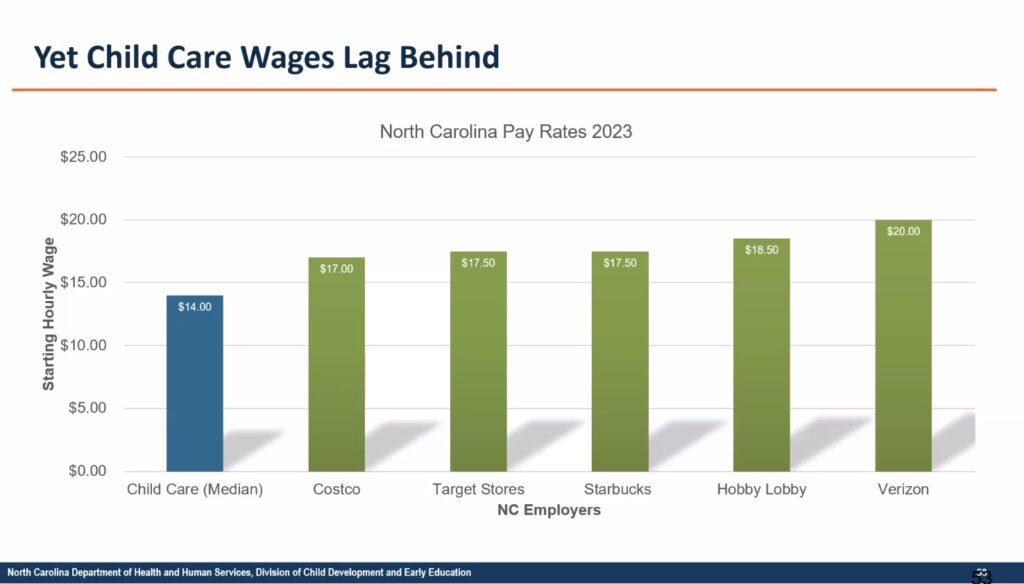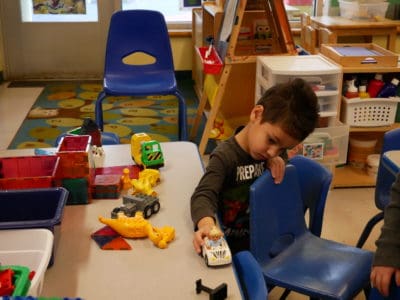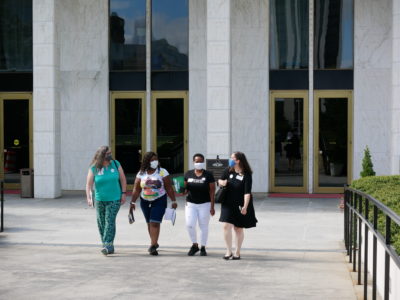

The North Carolina Child Fatality Task Force on Thursday approved its recommendations for the legislative short session, including increasing state investments in child care.
The session, which starts in April, comes just months before the state’s child care programs run out of federal stabilization funding at the end of June — a moment the early childhood field has been calling the “child care cliff.”
“We are toes-over-the-edge of a billion-dollar cliff,” Ariel Ford, director of the Division of Child Development and Early Education (DCDEE), told the task force in a presentation.
The task force “examines the causes of child death and makes recommendations to the Governor and General Assembly on how to prevent child death, prevent abuse and neglect, and support the safety and well-being of children,” as described on its website.
Families need child care so parents can work, and children need high-quality environments to learn, Ford said.
But how does this relate to a group studying child fatality? High-quality child care is also an evidence-backed prevention strategy for abuse, neglect, and child death, she explained.
“If parents are allowed to work and meet the goals they have financially and educationally for their family, it reduces the likelihood that they are going to be under the kinds of stress that would lead to child maltreatment and harm,” Ford said.
Yet child care will be harder to come by if funds expire without help from the state. In other states where federal funds have run out, child care has become less available and more expensive, according to a January survey of 10,000 providers from the National Association for the Education of Young Children.
An ‘unsustainable business practice’
The child care industry is often described as a “broken market.” Child care businesses are unable to provide the desired service — high-quality care — at an affordable price for most families, Ford said.
“The teachers can’t afford to stay in this profession that they love, and that’s creating this really unsustainable business practice,” she said. “… Our businesses can’t charge families more to be able to pay their teachers more.”
Ford explained how the pandemic worsened this equation. Other industries that require similar entry-level credentials have increased wages. Child care wages have lagged, even as programs used the federal funds to increase compensation. As those funds expire, programs will find it even harder to compete for qualified staff, she said.
“They’re only earning about $14 an hour, and for most of them, this is not enough for them to meet their basic needs,” Ford said.


What kinds of investments are needed?
The specifics of what kinds of child care investments DCDEE will back for the short session were not included in the task force meeting, as to not get in front of Gov. Roy Cooper’s budget proposal.
But Ford said they probably will include increases in child care subsidy, both to help more families afford care and to raise the rates providers receive to provide that care. She pointed to a subsidy floor proposal, introduced but not passed during last year’s session, as an important policy. It would give providers across all 100 counties at least the state average rate instead of rates varying based on county’s market rates.
“That was a really important bill that did not make it across the finish line, but we were really excited to see movement on that,” she said. “This is one of the things that potentially would be coming forward in the governor’s budget.”
Advocates also pushed for an extension of stabilization grants last year, asking for a one-time $300 million to help the state avoid the funding cliff. That funding did not make it into last year’s budget.
Instead, the legislature directed DCDEE to use federal funds previously designated to support the subsidy system to extend grants through June of this year. It also established a two-year pilot in three regions, called Tri-Share, that splits the cost of child care between participating businesses, eligible employees, and the state. And it directed DCDEE and the Child Care Commission to review and modernize its Quality Rating and Improvement System.
“We continue to work towards long-term solutions, but we have a short-term funding problem that is at our front door,” Ford said.
The link between child care and harm reduction
Whitney Belich, co-chair of the task force’s intentional death prevention subcommittee and the child abuse resource prosecutor with the NC Conference of District Attorneys, said Thursday that child care investments can safeguard children in multiple ways.
Besides decreasing daily stress, programs can share useful information and resources with parents. Teachers can also be trained to look for potential signs of abuse or neglect that need intervention or reporting.
“As far as abuse and neglect goes, it’s extremely important to have essentially a break for parents that may be overwhelmed and need to get back to work,” Belich said. “They’re also able to learn things through the child care program. And our child care programs get eyes on those kids, which is extremely important for child abuse reporting and neglect reporting.”
Child care subsidies are among several financial supports for families that experts say can help prevent abuse and neglect, said Paul Lanier, associate director for the Jordan Institute for Families, UNC-Chapel Hill’s school of social work.
“Poverty is the strongest and most consistent predictor of child abuse and neglect,” Lanier said in an email. “Increasing access to child care subsidy and other economic supports for families should also be thought of as an effective maltreatment prevention strategy. Our preliminary analysis of data for North Carolina shows that families who have had consistent access to child care subsidy have lower risk for child neglect.”
Doula services, firearm storage, and studying fentanyl-related child deaths
The task force also recommended:
- Legislation that allows counties to implement Fetal and Infant Mortality Review (FIMR) programs and gives FIMR staff access to necessary medical records. FIMR programs further investigate the circumstances of infant deaths, with a focus on centering families and parents’ voices and looking for systemic solutions.
- Funding for Medicaid reimbursement of community-based doula services throughout pregnancy and during the postpartum period, as well as professional supports for doulas. The requests were estimated at $1.5 million recurring for reimbursement, and $550,000 nonrecurring for training and supports.
- Recurring funding for the NC Office of Violence Prevention, which is aimed at implementing a public health approach to violence prevention — bridging a gap between public safety and public health.
- Recurring funding for the NC S.A.F.E. Campaign, which educates the public about firearm safe storage, and changing current state law that addresses safe storage to hold individuals accountable for safe storage around any minors, not just those who live in the same residence.
- Legislation that addresses addictive social media algorithms.
- Recurring funds to increase the numbers of specialized support personnel in schools, such as nurses, social workers, counselors, and psychologists.
- Internal study of paid family leave insurance and its impact on businesses; congenital syphilis prevention; and fentanyl-related deaths of children and adolescents.







